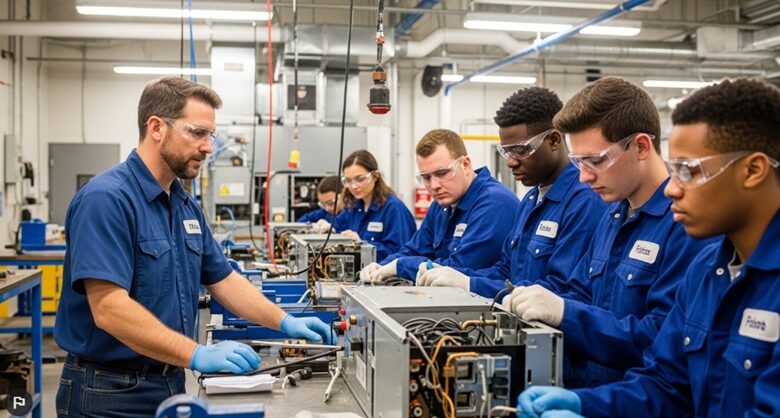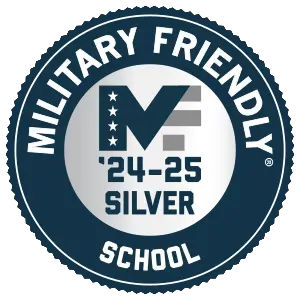What Skills Do You Need to Succeed as an HVAC Technician?

Becoming an HVAC technician is like building a house. You need the right tools, a solid foundation, and smart planning. Just like a home relies on strong materials and skilled hands, success in HVAC takes hard and soft skills.
What Skills Do You Need to Succeed as an HVAC Technician?
As an HVAC technician, you will need both hard and soft skills to succeed. Some of those skills that you hone at OBC include:
Hard HVAC Technician Skills
System Installation – installing HVAC systems involves setting up furnaces, air conditioners, heat pumps, and ductwork based on specs.
Electrical Knowledge – you must understand basic electrical theory to wire equipment safely and diagnose electrical faults. For example, you may need to troubleshoot a furnace control board and replace a faulty relay without damaging the circuit.
Refrigerant Handling (EPA Certified) – HVAC techs need EPA Section 608 certification to handle refrigerants legally and safely. The good news is that this is part of the curriculum at OBC.
System Diagnostics – includes using tools like voltmeters, gauges, and apps to find issues and recommend fixes. For example, you may use a digital manifold gauge to test for low refrigerant pressure in a non-cooling unit.
Blueprint Reading – you will need to interpret mechanical drawings to understand system layout, load calculations, and duct sizing. This includes reading schematics to install ductwork in a commercial building according to engineered plans.
Brazing and Soldering – involves joining copper pipes and fittings for refrigerant lines or water lines to avoiding leaks.
Airflow Testing – measuring static pressure and airflow ensures the system operates efficiently. For example, you may use a manometer and balancing dampers to correct uneven room temperatures.
Thermostat Programming – you will install and configure both basic and smart thermostats to match user needs.
Combustion Analysis – gas-burning systems need proper tuning to avoid carbon monoxide risks and improve efficiency.
Preventive Maintenance – regular tune-ups reduce breakdowns and extend equipment lifespan.
For example, you may clean coils, replace filters, check capacitor values, and inspect electrical connections during a seasonal service.
Soft HVAC Technician Skills
Here are some of the soft skills you will need to succeed:
Customer Service – you will often enter homes or businesses, so being respectful, clear, and helpful builds trust. For example, you should explain a diagnosis in plain language and offer repair options with upfront pricing.
Communication – your work often requires clear communication with customers, dispatch, and other techs. This may involve texting dispatch updates and clearly writing notes on a job ticket, so coworkers know what’s been done.
Problem Solving – systems don’t always fail the same way. Diagnosing root causes requires logical thinking.
Attention to Detail – missing a small issue can lead to system failure or safety risks. For example, you may spot a cracked heat exchanger that could leak carbon monoxide into the home.
Time Management – you might handle several jobs per day. Being organized is important. This may involve completing all service calls by prioritizing urgent cases and staying on schedule.
Adaptability – you will work in homes, attics, rooftops, crawlspaces, and outdoors; in all seasons. It is important to adapt to your environment.
Teamwork – large installations or fast repairs often require a crew. Cooperation leads to faster, safer jobs.
Work Ethic – showing up early, staying late if needed, and taking pride in your work builds reputation.
Stress Management – emergencies can happen at any time. Staying calm helps you think clearly.
Willingness to Learn – HVAC equipment evolves, and you may find yourself learning about new systems, tools, and codes. Your success depends on continuous learning.
How Does OBC Help You Build HVAC Technician Skills?
OBC offers many ways to help you build HVAC technician skills. They include:
Hands-On Training
OBC’s HVAC program gives you industry standard equipment to work with so you are prepared for your new role as an HVAC technician. You will practice installing, testing, and repairing systems in lab settings just like what you will find on a job site.
Classes That Teach the Right Skills
You learn key hard skills like refrigeration, wiring, soldering, and system diagnostics. These are taught through step-by-step instruction and practice. Soft skills like communication and teamwork are also part of the curriculum.
Instructors with Field Experience
OBC instructors have worked in the HVAC industry. They teach what matters on the job like how to talk with customers, troubleshooting under pressure, and meeting local building codes.
Support with Certifications
OBC prepares you for the EPA Section 608 certification. This is required to legally handle refrigerants. Test prep and practice are built into the program, so you graduate ready to take the exam.
Career Services and Employer Connections
OBC’s career services team helps you build resumes, practice interviews, and connect with local employers. Many employers already know the value of an OBC-trained graduate.
Want to Learn More?
Now that you know we will help prepare you for residential and commercial HVAC, it is time to learn more about Ohio Business College. If you have a passion for heating and cooling, working in the HVAC/R industry might just be for you. Entering a career in a field as potentially rewarding as HVAC/R all starts with an HVAC/R training program. At Ohio Business College, we can help you gain the skills and knowledge that can serve as the foundation of a rewarding career as an HVAC/R technician.
Contact us today to learn more about our HVAC/R program.

